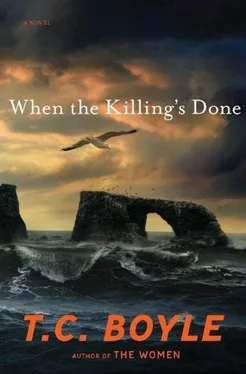At first they lived with Greg’s parents in a house on the mesa, just above the marina, but the house — a big rambling craftsman with upper and lower porches and views of the sea out of the south- and east-facing windows — was crowded for all its size. There were Greg’s five siblings, all younger than he and perpetually embroiled in their internecine disputes, his father’s mother, two bachelor uncles and an assortment of cats, dogs and caged and evilly cackling birds. Though they had a room to themselves, Kat just couldn’t feel at home. Her mother-in-law fought off every attempt she made to contribute — she wouldn’t let her chop vegetables, wash dishes, even take out the trash, and every time she settled into the sofa or wandered into the kitchen she felt like an intruder, which, in fact, she was. And no matter how utterly without prejudice she felt herself to be, it was nonetheless strange to find herself living in a Japanese household — or Japanese American, as she was constantly correcting herself.
It wasn’t that they were all that much different from anybody else — they ate steaks and burgers and hot dogs and all the rest of it, maybe more fish because fish was the family business — but that anything, any other household, even if it had been right next door to her mother’s house in Venice, would have seemed disorienting, especially in her condition. She was used to silence and order, a house in which three generations of women lived and worked in peace without the disruptive presence of men, children, pets. But here was chaos, here was the other, a new association and a new regime. The smells were different, the little rituals surrounding meals, where people sat, the noise and confusion of the kids and their mob of friends — even the dogs, a pair of Akitas, were like nothing she’d ever seen, their heads as broad and flat as a bear’s, their habits secretive, and where did they do their business? Time and again she’d surprised them in her bed and twice she’d found the blankets suspiciously damp.
Within the month she began pestering Greg to look for a place of their own — a little privacy, that was all she wanted, nothing against his family — and when Alma came along and she was nursing and shutting herself up all day in her room just so she wouldn’t have to listen to one more repetition of her mother-in-law’s dicta on the subject of child rearing, it became imperative. By spring of the following year, 1969, she got her wish. Greg came home from work one clammy socked-in evening, swept his hair out of his face and announced in a voice that could hardly contain its excitement that they were moving to the harbor, to live on a boat he’d bought for $3,600, one-third down, the rest due after the first year. But for the baby, she would have leapt into his arms. As it was, she took hold of him in one arm while cradling Alma in the other, and the three of them danced round the room till Greg’s uncle Billy, who worked nights and slept in the room directly beneath them, mounted the stairs to complain about the noise.
The Black Gold was a working boat, a converted thirty-two-foot cabin cruiser with an open rear deck of fiberglass in place of the original wood planking and a compartment for the catch below; the main cabin and sleeping quarters were aft. There was a galley the size of an icebox, an icebox the size of an orange crate, a built-in table that folded up when not in use (which was never), a little upright coffin of a head and a plywood slab, decorated with a disintegrating foam mattress and a sleeping bag that gave off a mélange of festering odors under the bow. Showers, toilets, laundry were available in the marina. Kat liked to joke that the boat gave a new definition to damp. Every garment, every diaper, every towel might as well have been a sponge, and the only relief was when the sun shone and the wind picked up and things could be strung out to dry. On days when she was in harbor, that is. And those days were rare, at least at first.
She’d wake in the dark to Alma’s cries, take her to bed with them to feed her, then get up and make Greg his breakfast, fried rice, four eggs, mackerel or abalone or Canadian bacon seared in the pan, toasted cheese, coffee by the vat. And then, when his partner, Mickey Mans, arrived looking hungover, starved and stoned in equal measures, she took the baby and went up the hill to her mother-in-law’s for the day, or walked all the way up Anacapa Street to the library to sit and browse and play with Alma till she was so bored she could barely draw another breath. But they were living on the cheap and they had their privacy and she was waiting for him at the slip each night with a bag of groceries when he chugged in through the mouth of the harbor. She became a genius of the quick but nutritious meal, stir-fry mainly, cauliflower, bok choy, mushrooms, snow peas, bean sprouts — whatever looked good in the market — augmented by the halibut, lobster, crab and rockfish she’d buy for next to nothing from the fishermen when they came in.
And uni , though she never really developed a taste for it. Uni —sea urchin — was what Greg and Mickey were after, what they were exclusively after, because the abalone fishery was taking a nosedive from over-harvesting, groundfish numbers were down and lobsters seasonal, and Greg’s father had found a niche market for the urchins, which he was selling to a distributor in L.A. for transshipment to Japan. They were among the first to exploit the resource, but by the late seventies, when Alma was working her way through fourth, fifth and sixth grade and thinking that living on a boat was the most natural thing in the world, the real boom set in. Urchins, previously considered pests, were suddenly the hottest thing on the market. The Japanese couldn’t get enough of them. It was the roe they were after — or the gonads actually, tangerine-colored organs arranged in a star shape inside the spiny shell, which were extracted by the wholesaler, packed in ice and flown to Tokyo overnight. Black gold, that was what people called the urchins, though they shaded to red and purple under the sun, and the money was good, the money was boss, out of sight, too good to believe.
By the time Alma was in sixth grade they’d bought their own house on a back street within walking distance of the harbor, and the dampness, the mold, the cramped quarters and the smell of fish so overpowering they might as well have been living in the muck at the bottom of the sea, were behind them. It wasn’t perfect — for the first few months Alma slept fitfully, waking in tears because her bed wouldn’t move and the floor never rocked or gave or swayed, and when she did sleep it was on the carpet beneath the bed, as if she were still squeezed into her berth under the foredeck — but for Kat it was night and day. Having a house away from the water where you had some space to move around in and didn’t have to worry all night about your daughter pitching overboard and drowning and you could walk across the kitchen floor without water squishing under your heels was cleansing, revolutionary, liberating, not to mention what it did for their sex life — she couldn’t count the nights she and Greg had had to steal out of the cabin to make goose-pimpled love on the foredeck or on the truncated leather seat in the cockpit so Alma wouldn’t hear. And then there was the minor miracle of Mrs. Meehan, the woman they found to watch Alma after school, freeing up Kat to work the boat along with Greg and Mickey.
She became their tender, which allowed them to spend more time harvesting urchins and less hassling with the equipment, and the change brought her back to life after the years spent rotating between the library, the Takesue household and the part-time jobs she took just to drive down the boredom once Alma started school. The first few days were rough, but she caught on quickly — Greg was patient with her, even if his partner, especially in the mornings before the first dive, tended to be a bear — but within a month her confidence began to grow along with the muscles in her arms and shoulders, and if it wasn’t exactly feminine to have an upper body made of iron, it felt good. And so did being away from shore, outdoors, under the open sky.
Читать дальше












